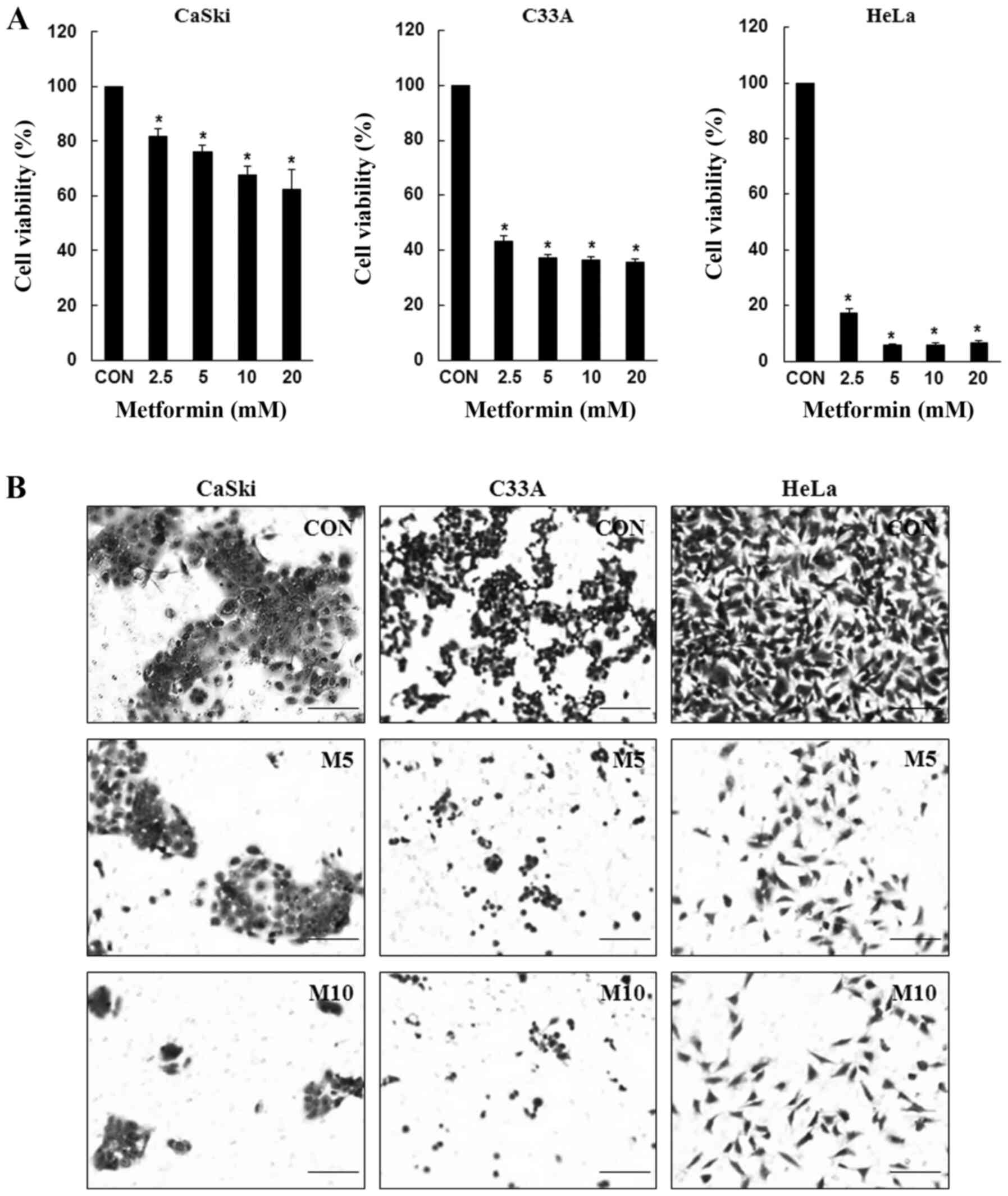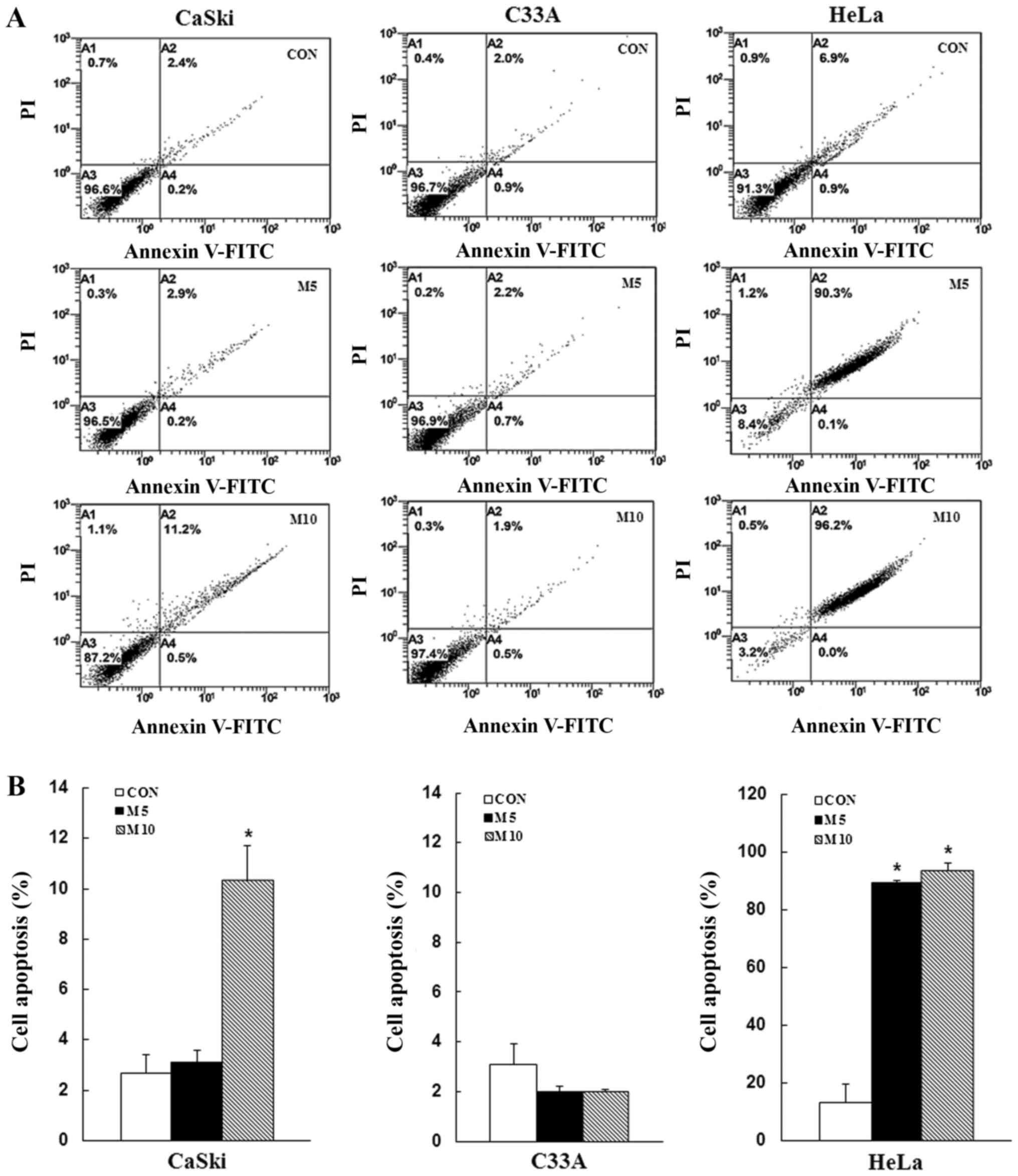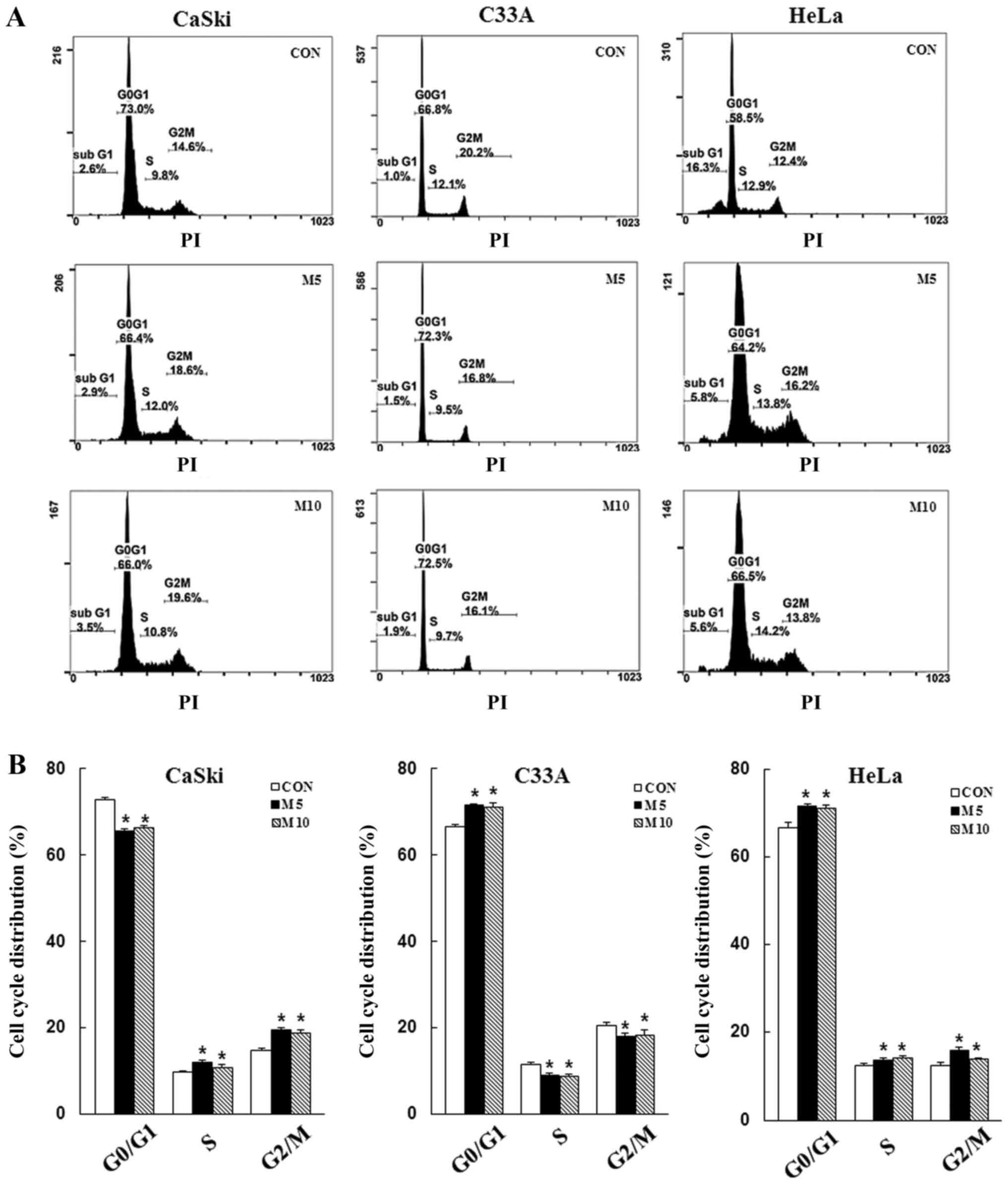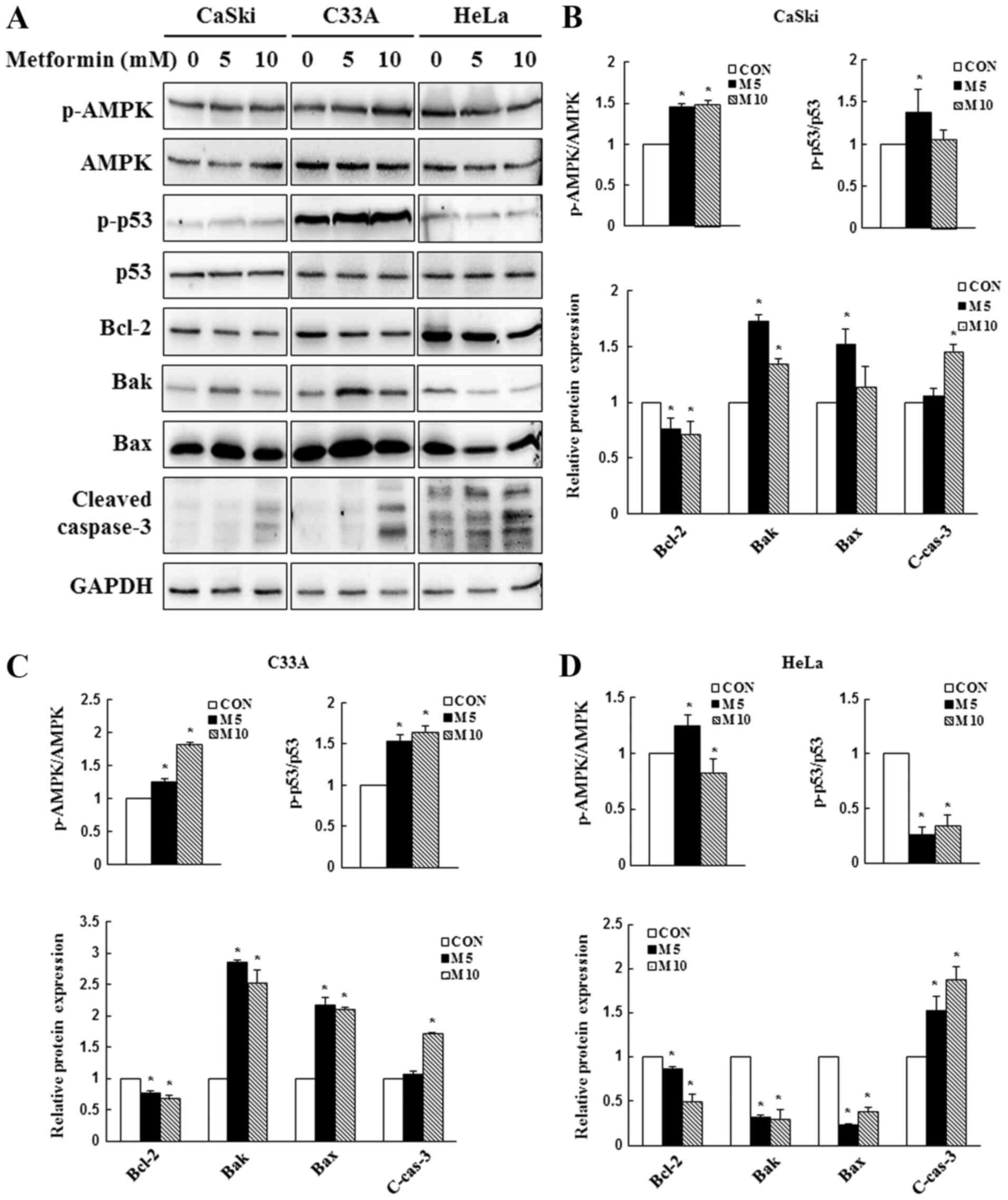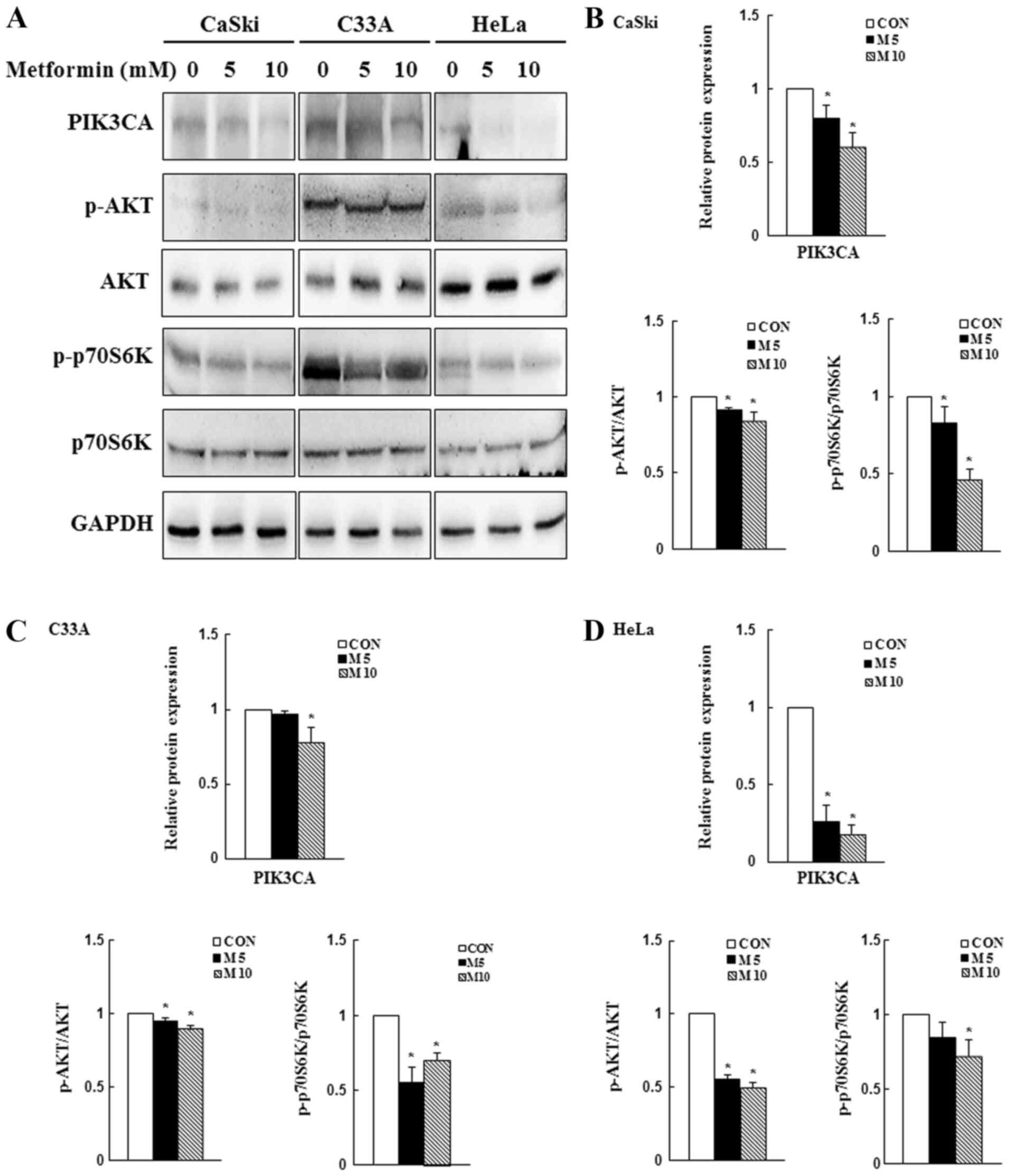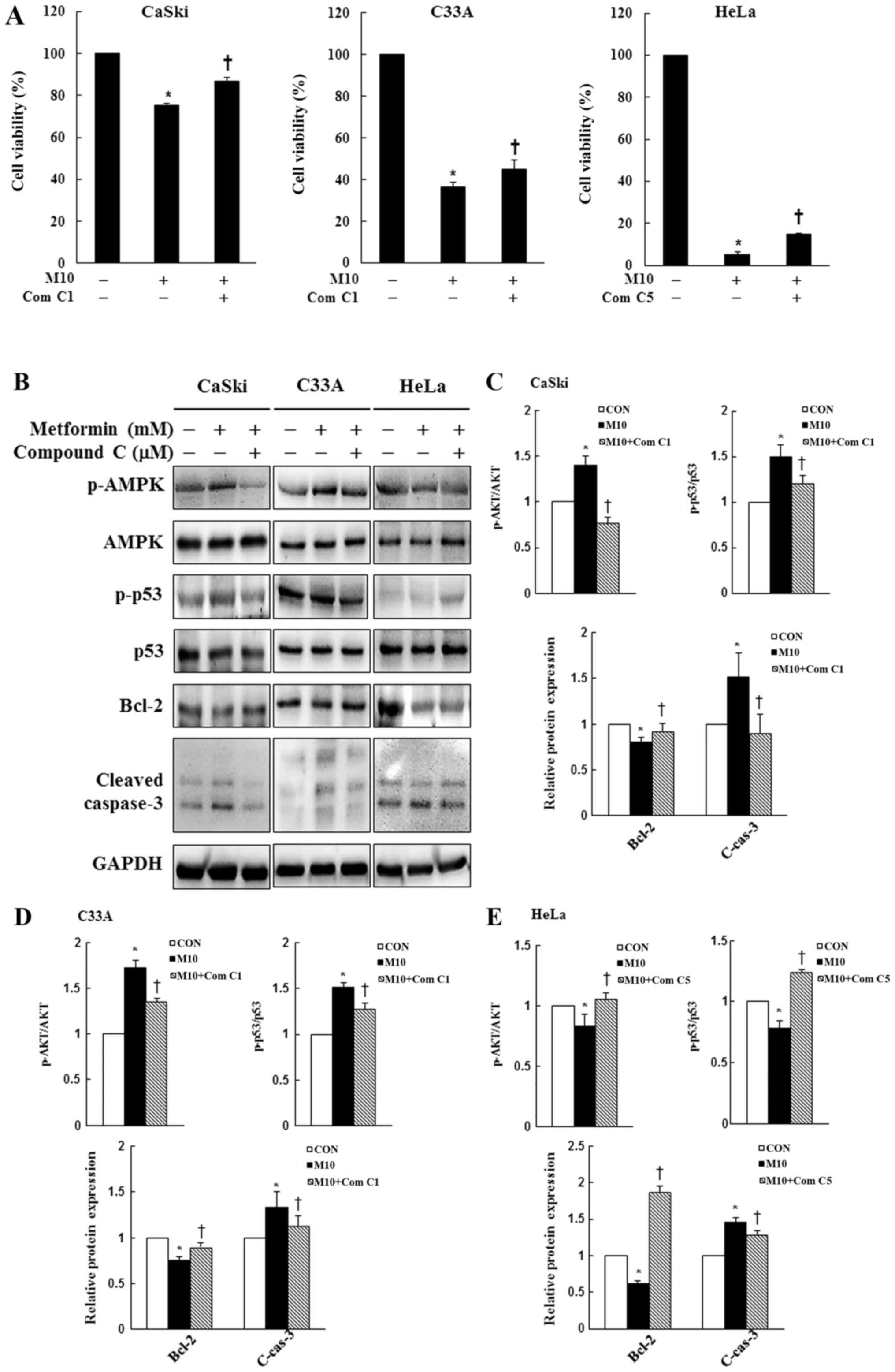|
1
|
Small W Jr, Bacon MA, Bajaj A, Chuang LT,
Fisher BJ, Harkenrider MM, Jhingran A, Kitchener HC, Mileshkin LR,
Viswanathan AN and Gaffney DK: Cervical cancer: A global health
crisis. Cancer. 123:2404–2412. 2017. View Article : Google Scholar
|
|
2
|
Simms KT, Steinberg J, Caruana M, Smith
MA, Lew JB, Soerjomataram I, Castle PE, Bray F and Canfell K:
Impact of scaled up human papillomavirus vaccination and cervical
screening and the potential for global elimination of cervical
cancer in 181 countries, 2020-99: A modelling study. Lancet Oncol.
20:394–407. 2019. View Article : Google Scholar
|
|
3
|
Ch PN, Gurram L, Chopra S and Mahantshetty
U: The management of locally advanced cervical cancer. Curr Opin
Oncol. 30:323–329. 2018. View Article : Google Scholar
|
|
4
|
Rosen VM, Guerra I, McCormack M,
Nogueira-Rodrigues A, Sasse A, Munk VC and Shang A: Systematic
review and network meta-analysis of bevacizumab plus first-line
topotecan-paclitaxel or cisplatin-paclitaxel versus
non-bevacizumab-containing therapies in persistent, recurrent, or
metastatic cervical cancer. Int J Gynecol Cancer. 27:1237–1246.
2017. View Article : Google Scholar
|
|
5
|
Bethesda. SEER Cancer Stat Facts. Cervical
Cancer. National Cancer Institute; simplehttps://seer.cancer.gov/statfacts/html/cervix.htmlMay.
2020
|
|
6
|
Nathan DM, Buse JB, Davidson MB, Heine RJ,
Holman RR, Sherwin R and Zinman B; Professional Practice Committee,
American Diabetes Association, European Association for the Study
of Diabetes: Management of hyperglycaemia in type 2 diabetes: A
consensus algorithm for the initiation and adjustment of therapy, :
A consensus statement from the American Diabetes Association and
the European Association for the study of Diabetes. Diabetologia.
49:1711–1721. 2006. View Article : Google Scholar
|
|
7
|
Crawley D, Chandra A, Loda M, Gillett C,
Cathcart P, Challacombe B, Cook G, Cahill D, Santa Olalla A, Cahill
F, et al: Metformin and longevity (METAL): A window of opportunity
study investigating the biological effects of metformin in
localised prostate cancer. BMC Cancer. 17:4942017. View Article : Google Scholar
|
|
8
|
Quinn BJ, Dallos M, Kitagawa H,
Kunnumakkara AB, Memmott RM, Hollander MC, Gills JJ and Dennis PA:
Inhibition of lung tumorigenesis by metformin is associated with
decreased plasma IGF-I and diminished receptor tyrosine kinase
signaling. Cancer Prev Res (Phila). 6:801–810. 2013. View Article : Google Scholar
|
|
9
|
El-Haggar SM, El-Shitany NA, Mostafa MF
and El-Bassiouny NA: Metformin may protect nondiabetic breast
cancer women from metastasis. Clin Exp Metastasis. 33:339–357.
2016. View Article : Google Scholar
|
|
10
|
Luo Q, Hu D, Hu S, Yan M, Sun Z and Chen
F: In vitro and in vivo anti-tumor effect of metformin as a novel
therapeutic agent in human oral squamous cell carcinoma. BMC
Cancer. 12:5172012. View Article : Google Scholar
|
|
11
|
Hosono K, Endo H, Takahashi H, Sugiyama M,
Sakai E, Uchiyama T, Suzuki K, Iida H, Sakamoto Y, Yoneda K, et al:
Metformin suppresses colorectal aberrant crypt foci in a short-term
clinical trial. Cancer Prev Res (Phila). 3:1077–1083. 2010.
View Article : Google Scholar
|
|
12
|
Tseng HW, Li SC and Tsai KW: Metformin
treatment suppresses melanoma cell growth and motility through
modulation of microRNA expression. Cancers (Basel). 11:2092019.
View Article : Google Scholar
|
|
13
|
Hwang AL, Haynes K, Hwang WT and Yang YX:
Metformin and survival in pancreatic cancer: A retrospective cohort
study. Pancreas. 42:1054–1059. 2013. View Article : Google Scholar
|
|
14
|
Podhorecka M, Ibanez B and Dmoszyńska A:
Metformin-its potential anti-cancer and anti-aging effects. Postepy
Hig Med Dosw (Online). 71:170–175. 2017. View Article : Google Scholar
|
|
15
|
Shi WY, Xiao D, Wang L, Dong LH, Yan ZX,
Shen ZX, Chen SJ, Chen Y and Zhao WL: Therapeutic metformin/AMPK
activation blocked lymphoma cell growth via inhibition of mTOR
pathway and induction of autophagy. Cell Death Dis. 3:e2752012.
View Article : Google Scholar
|
|
16
|
Wang CF, Zhang G, Zhao LJ, Qi WJ, Li XP,
Wang JL and Wei LH: Overexpression of the insulin receptor isoform
a promotes endometrial carcinoma cell growth. PLoS One.
8:e690012013. View Article : Google Scholar
|
|
17
|
He Y, Cao L, Wang L, Liu L, Huang Y and
Gong X: Metformin inhibits proliferation of human thyroid cancer
TPC-1 cells by decreasing LRP2 to suppress the JNK pathway. Onco
Targets Ther. 13:45–50. 2020. View Article : Google Scholar
|
|
18
|
Ling S, Xie H, Yang F, Shan Q, Dai H, Zhuo
J, Wei X, Song P, Zhou L, Xu X and Zheng S: Metformin potentiates
the effect of arsenic trioxide suppressing intrahepatic
cholangiocarcinoma: Roles of p38 MAPK, ERK3, and mTORC1. J Hematol
Oncol. 10:592017. View Article : Google Scholar
|
|
19
|
Vazquez-Martin A, Oliveras-Ferraros C and
Menendez JA: The antidiabetic drug metformin suppresses her2
(erbb-2) oncoprotein overexpression via inhibition of the mtor
effector p70s6k1 in human breast carcinoma cells. Cell Cycle.
8:88–96. 2009. View Article : Google Scholar
|
|
20
|
Saber S, Ghanim AMH, El-Ahwany E and
El-Kader EMA: Novel complementary antitumour effects of celastrol
and metformin by targeting IκBκB, apoptosis and NLRP3 inflammasome
activation in diethylnitrosamine-induced murine
hepatocarcinogenesis. Cancer Chemother Pharmacol. 85:331–343. 2020.
View Article : Google Scholar
|
|
21
|
Kowall B, Stang A, Rathmann W and Kostev
K: No reduced risk of overall, colorectal, lung, breast, and
prostate cancer with metformin therapy in diabetic patients:
Database analyses from Germany and the UK. Pharmacoepidemiol Drug
Saf. 24:865–874. 2015. View
Article : Google Scholar
|
|
22
|
Iliopoulos D, Hirsch HA and Struhl K:
Metformin decreases the dose of chemotherapy for prolonging tumor
remission in mouse xenografts involving multiple cancer cell types.
Cancer Res. 71:3196–3201. 2011. View Article : Google Scholar
|
|
23
|
Tyszka-Czochara M, Lasota M and Majka M:
Caffeic acid and metformin inhibit invasive phenotype induced by
TGF-β1 in C-4I and HTB-35/SiHa human cervical squamous carcinoma
cells by acting on different molecular targets. Int J Mol Sci.
19:2662018. View Article : Google Scholar
|
|
24
|
Xia C, Chen R, Chen J, Qi Q, Pan Y, Du L,
Xiao G and Jiang S: Combining metformin and nelfinavir exhibits
synergistic effects against the growth of human cervical cancer
cells and xenograft in nude mice. Sci Rep. 7:433732017. View Article : Google Scholar
|
|
25
|
Pollak MN: Investigating metformin for
cancer prevention and treatment: The end of the beginning. Cancer
Discov. 2:778–790. 2012. View Article : Google Scholar
|
|
26
|
Pollak M: The insulin and insulin-like
growth factor receptor family in neoplasia: An update. Nat Rev
Cancer. 12:159–169. 2012. View
Article : Google Scholar
|
|
27
|
Shackelford DB and Shaw RJ: The LKB1-AMPK
pathway: Metabolism and growth control in tumour suppression. Nat
Rev Cancer. 9:563–575. 2009. View
Article : Google Scholar
|
|
28
|
Foretz M, Carling D, Guichard C, Ferre P
and Foufelle F: AMP-activated protein kinase inhibits the
glucose-activated expression of fatty acid synthase gene in rat
hepatocytes. J Biol Chem. 273:14767–14771. 1998. View Article : Google Scholar
|
|
29
|
Choi YK and Park KG: Metabolic roles of
AMPK and metformin in cancer cells. Mol Cells. 36:279–287. 2013.
View Article : Google Scholar
|
|
30
|
Buzzai M, Jones RG, Amaravadi RK, Lum JJ,
DeBerardinis RJ, Zhao F, Viollet B and Thompson CB: Systemic
treatment with the antidiabetic drug metformin selectively impairs
p53-deficient tumor cell growth. Cancer Res. 67:6745–6752. 2007.
View Article : Google Scholar
|
|
31
|
Armando RG, Mengual Gómez DL and Gomez DE:
New drugs are not enough-drug repositioning in oncology: An update.
Int J Oncol. 56:651–684. 2020.
|
|
32
|
Datta SR, Brunet A and Greenberg ME:
Cellular survival: A play in three Akts. Genes Dev. 13:2905–2927.
1999. View Article : Google Scholar
|
|
33
|
Nitulescu GM, De Venter MV, Nitulescu G,
Ungurianu A, Juzenas P, Peng Q, Olaru OT, Grădinaru D, Tsatsakis A,
Tsoukalas D, et al: The Akt pathway in oncology therapy and beyond
(Review). Int J Oncol. 53:2319–2331. 2018.
|
|
34
|
Bellacosa A, Testa JR, Moore R and Larue
L: A portrait of AKT kinases: Human cancer and animal models depict
a family with strong individualities. Cancer Biol Ther. 3:268–275.
2004. View Article : Google Scholar
|
|
35
|
Cheng JQ, Lindsley CW, Cheng GZ, Yang H
and Nicosia SV: The Akt/PKB pathway: Molecular target for cancer
drug discovery. Oncogene. 24:7482–7492. 2005. View Article : Google Scholar
|
|
36
|
Shan ZZ, Chen PN, Wang F, Wang J and Fan
QX: Expression of P-EGFR and P-Akt protein in esophageal squamous
cell carcinoma and its prognosis. Oncol Lett. 14:2859–2863. 2017.
View Article : Google Scholar
|
|
37
|
Yu X, Yuan Y, Zhi X, Teng B, Chen X, Huang
Q, Chen Y, Guan Z and Zhang Y: Correlation between the protein
expression of A-kinase anchor protein 95, cyclin D3 and AKT and
pathological indicators in lung cancer tissues. Exp Ther Med.
10:1175–1181. 2015. View Article : Google Scholar
|
|
38
|
Yang SX, Costantino JP, Kim C, Mamounas
EP, Nguyen D, Jeong JH, Wolmark N, Kidwell K, Paik S and Swain SM:
Akt phosphorylation at Ser473 predicts benefit of paclitaxel
chemotherapy in node-positive breast cancer. J Clin Oncol.
28:2974–2981. 2010. View Article : Google Scholar
|
|
39
|
Lu C and Shervington A: Chemoresistance in
gliomas. Mol Cell Biochem. 312:71–80. 2008. View Article : Google Scholar
|
|
40
|
Jacobsen K, Bertran-Alamillo J, Molina MA,
Teixidó C, Karachaliou N, Pedersen MH, Castellví J, Garzón M,
Codony-Servat C, Codony-Servat J, et al: Convergent Akt activation
drives acquired EGFR inhibitor resistance in lung cancer. Nat
Commun. 8:4102017. View Article : Google Scholar
|
|
41
|
Nieminen AI, Eskelinen VM, Haikala HM,
Tervonen TA, Yan Y, Partanen JI and Klefström J: Myc-induced
AMPK-phospho p53 pathway activates Bak to sensitize mitochondrial
apoptosis. Proc Natl Acad Sci USA. 110:E1839–E1848. 2013.
View Article : Google Scholar
|
|
42
|
LoPiccolo J, Blumenthal GM, Bernstein WB
and Dennis PA: Targeting the PI3K/Akt/mTOR pathway: Effective
combinations and clinical considerations. Drug Resist Updat.
11:32–50. 2008. View Article : Google Scholar
|
|
43
|
Li Z, Dong H, Li M, Wu Y, Liu Y, Zhao Y,
Chen X and Ma M: Honokiol induces autophagy and apoptosis of
osteosarcoma through PI3K/Akt/mTOR signaling pathway. Mol Med Rep.
17:2719–2723. 2018.
|
|
44
|
Lee MS, Hsu CC, Wahlqvist ML, Tsai HN,
Chang YH and Huang YC: Type 2 diabetes increases and metformin
reduces total, colorectal, liver and pancreatic cancer incidences
in Taiwanese: A representative population prospective cohort study
of 800,000 individuals. BMC Cancer. 11:202011. View Article : Google Scholar
|
|
45
|
Evans JM, Donnelly LA, Emslie-Smith AM,
Alessi DR and Morris AD: Metformin and reduced risk of cancer in
diabetic patients. BMJ. 330:1304–1305. 2005. View Article : Google Scholar
|
|
46
|
Chen K, Li Y, Guo Z, Zeng Y, Zhang W and
Wang H: Metformin: Current clinical applications in nondiabetic
patients with cancer. Aging (Albany NY). 12:3993–4009. 2020.
View Article : Google Scholar
|
|
47
|
Quinn BJ, Kitagawa H, Memmott RM, Gills JJ
and Dennis PA: Repositioning metformin for cancer prevention and
treatment. Trends Endocrinol Metab. 24:469–480. 2013. View Article : Google Scholar
|
|
48
|
Li B, Zhou P, Xu K, Chen T, Jiao J, Wei H,
Yang X, Xu W, Wan W and Xiao J: Metformin induces cell cycle
arrest, apoptosis and autophagy through ROS/JNK signaling pathway
in human osteosarcoma. Int J Biol Sci. 16:74–84. 2020. View Article : Google Scholar
|
|
49
|
Zhou X, Kuang Y, Liang S and Wang L:
Metformin inhibits cell proliferation in SKM-1 cells via
AMPK-mediated cell cycle arrest. J Pharmacol Sci. 141:146–152.
2019. View Article : Google Scholar
|
|
50
|
Lee J, Hong EM, Kim JH, Jung JH, Park SW,
Koh DH, Choi MH, Jang HJ and Kae SH: Metformin induces apoptosis
and inhibits proliferation through the AMP-activated protein kinase
and insulin-like growth factor 1 receptor pathways in the bile duct
cancer cells. J Cancer. 10:1734–1744. 2019. View Article : Google Scholar
|
|
51
|
Pater MM and Pater A: Human papillomavirus
types 16 and 18 sequences in carcinoma cell lines of the cervix.
Virology. 145:313–318. 1985. View Article : Google Scholar
|
|
52
|
Donat U, Rother J, Schäfer S, Hess M,
Härtl B, Kober C, Langbein-Laugwitz J, Stritzker J, Chen NG,
Aguilar RJ, et al: Characterization of metastasis formation and
virotherapy in the human C33A cervical cancer model. PLoS One.
9:e985332014. View Article : Google Scholar
|
|
53
|
Hsieh Li SM, Liu ST, Chang YL, Ho CL and
Huang SM: Metformin causes cancer cell death through downregulation
of p53-dependent differentiated embryo chondrocyte 1. J Biomed Sci.
25:812018. View Article : Google Scholar
|
|
54
|
Xiao X, He Q, Lu C, Werle KD, Zhao RX,
Chen J, Davis BC, Cui R, Liang J and Xu ZX: Metformin impairs the
growth of liver kinase B1-intact cervical cancer cells. Gynecol
Oncol. 127:249–255. 2012. View Article : Google Scholar
|
|
55
|
Irie H, Banno K, Yanokura M, Iida M,
Adachi M, Nakamura K, Umene K, Nogami Y, Masuda K, Kobayashi Y, et
al: Metformin: A candidate for the treatment of gynecological
tumors based on drug repositioning. Oncol Lett. 11:1287–1293. 2016.
View Article : Google Scholar
|
|
56
|
Zhao B, Luo J, Wang Y, Zhou L, Che J, Wang
F, Peng S, Zhang G and Shang P: Metformin suppresses self-renewal
ability and tumorigenicity of osteosarcoma stem cells via reactive
oxygen species-mediated apoptosis and autophagy. Oxid Med Cell
Longev. 2019:92907282019. View Article : Google Scholar
|
|
57
|
Zhou XZ, Xue YM, Zhu B and Sha JP: Effects
of metformin on proliferation of human colon carcinoma cell line
SW-480. Nan Fang Yi Ke Da Xue Xue Bao. 30:1935–1938, 1942. 2010.(In
Chinese).
|
|
58
|
Kamarudin MNA, Sarker MMR, Zhou JR and
Parhar I: Metformin in colorectal cancer: Molecular mechanism,
preclinical and clinical aspects. J Exp Clin Cancer Res.
38:4912019. View Article : Google Scholar
|
|
59
|
Shaw RJ, Kosmatka M, Bardeesy N, Hurley
RL, Witters LA, DePinho RA and Cantley LC: The tumor suppressor
LKB1 kinase directly activates AMP-activated kinase and regulates
apoptosis in response to energy stress. Proc Natl Acad Sci USA.
101:3329–3335. 2004. View Article : Google Scholar
|
|
60
|
Ben Sahra I, Laurent K, Giuliano S,
Larbret F, Ponzio G, Gounon P, Le Marchand-Brustel Y,
Giorgetti-Peraldi S, Cormont M, Bertolotto C, et al: Targeting
cancer cell metabolism: The combination of metformin and
2-deoxyglucose induces p53-dependent apoptosis in prostate cancer
cells. Cancer Res. 70:2465–2475. 2010. View Article : Google Scholar
|
|
61
|
Cerezo M, Tichet M, Abbe P, Ohanna M,
Lehraiki A, Rouaud F, Allegra M, Giacchero D, Bahadoran P,
Bertolotto C, et al: Metformin blocks melanoma invasion and
metastasis development in AMPK/p53-dependent manner. Mol Cancer
Ther. 12:1605–1615. 2013. View Article : Google Scholar
|
|
62
|
Singh AR, Gu JJ, Zhang Q, Torka P,
Sundaram S, Mavis C and Hernandez-Ilizaliturri FJ: Metformin
sensitizes therapeutic agents and improves outcome in pre-clinical
and clinical diffuse large B-cell lymphoma. Cancer Metab. 8:102020.
View Article : Google Scholar
|
|
63
|
Chipuk JE, Kuwana T, Bouchier-Hayes L,
Droin NM, Newmeyer DD, Schuler M and Green DR: Direct activation of
Bax by p53 mediates mitochondrial membrane permeabilization and
apoptosis. Science. 303:1010–1014. 2004. View Article : Google Scholar
|
|
64
|
Chang YL, Lee HJ, Liu ST, Lin YS, Chen TC,
Hsieh TY, Huang HS and Huang SM: Different roles of p53 in the
regulation of DNA damage caused by1,2-heteroannelated
anthraquinones and doxorubicin. Int J Biochem Cell Biol.
43:1720–1728. 2011. View Article : Google Scholar
|
|
65
|
Fu YL, Zhang QH, Wang XW and He H:
Antidiabetic drug metformin mitigates ovarian cancer SKOV3 cell
growth by triggering G2/M cell cycle arrest and inhibition of
m-TOR/PI3K/Akt signaling pathway. Eur Rev Med Pharmacol Sci.
21:1169–1175. 2017.
|
|
66
|
Zhao Y, Sun H, Feng M, Zhao J, Zhao X, Wan
Q and Cai D: Metformin is associated with reduced cell
proliferation in human endometrial cancer by inbibiting
PI3K/AKT/mTOR signaling. Gynecol Endocrinol. 34:428–432. 2018.
View Article : Google Scholar
|
|
67
|
Zhang HH, Zhang Y, Cheng YN, Gong FL, Cao
ZQ, Yu LG and Guo XL: Metformin incombination with curcumin
inhibits the growth, metastasis, and angiogenesis of hepatocellular
carcinoma in vitro and in vivo. Mol Carcinog. 57:44–56. 2018.
View Article : Google Scholar
|
|
68
|
Storozhuk Y, Hopmans SN, Sanli T, Barron
C, Tsiani E, Cutz JC, Pond G, Wright J, Singh G and Tsakiridis T:
Metformin inhibits growth and enhances radiation response of
non-small cell lung cancer (NSCLC) through ATM and AMPK. Br J
Cancer. 108:2021–2032. 2013. View Article : Google Scholar
|
|
69
|
Dhillon SS, Groman A, Meagher A, Demmy T,
Warren GW and Yendamuri S: Metformin and not diabetes influences
the survival of resected early stage NSCLC patients. J Cancer Sci
Ther. 6:217–222. 2014.
|
|
70
|
Sayed R, Saad AS, ElWakeel L, Elkholy E
and Badary O: Metformin addition to chemotherapy in stage IV
non-small cell lung cancer: An open label randomized controlled
study. Asian Pac J Cancer Prev. 16:6621–6626. 2015. View Article : Google Scholar
|















